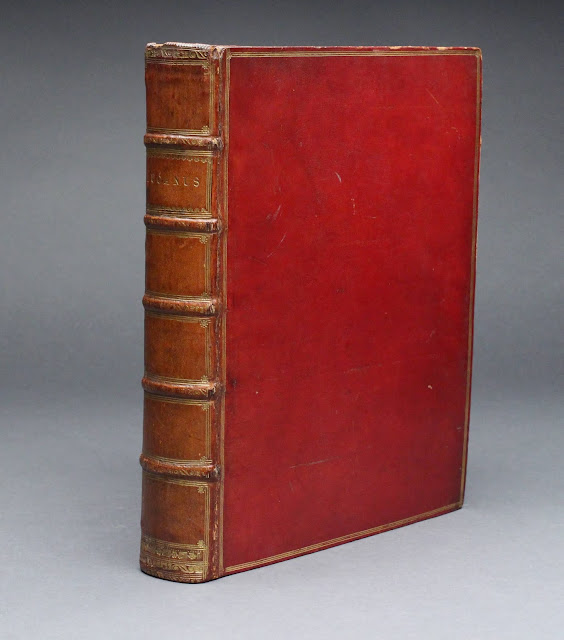Lucani , M. Annaei. PHARSALIA, Cum notis Hugonis Grotii, et Richardi Bentleii. Strawberry Hill [Horace Walpole], 1760. 4to. [6] + 525pp.
Copper engraved vignette by C. Grignion on title page, showing Strawberry Hill in the background. Additional engraved vignette by Grignion on message to the reader. Two period armorial bookplates and one old ownership ticket. Full straight grained period morocco with simple gilt tooling, spine divided into six panels, raised bands, gilt. Comb-marbled endpapers. All edges gilt. Printed on thick paper. Limited to 500 copies. Binding sound, very slightly tender along the top front board but holding very well. Very good. “Handsome copy”.
Flipping the pages results in a pleasant ruffling sound. Turning individual pages results in a mini-thunder from the crisp tautness of the thick paper.
Through poetic narrative and fantasy, Marcus Annaeus Lucanus
[better known as Lucan] describes what led up to the civil war between Julius
Caesar and Pompey the Great and subsequent events including, and ending with (Book
10) Caesar’s arrival in Egypt, where he meets Cleopatra, followed by subsequent
attempts on Caesar’s life. The title of the poem takes its name from the Battle
of Pharsalus in 48 BC where Caesar defeated Pompey the Great. “I sing
of a worse than civil war, of war fought between kinsmen over Pharsalia’s plains, of wickedness deemed
justice; of how a powerful people turned their own right hands against
themselves; of strife within families…” A.S. Kline translation.
Horace Walpole founded Strawberry Hill Press in 1757. As one
the early English private presses, so careful and innovative in typography and
layout, contemporary with John Baskerville, Walpole’s Strawberry Press would
produce numerous books and pamphlets including:
A Catalogue of the Royal and Noble Authors of England…. An Account of
Russia as it Was in the Year 1710 by Charles Lord Whitworth. With the help of his friend Richard Bentley
whose own father had notes for the first seven books, after some delay, Walpole
produced a Quarto of Lucan’s Pharsalia, of which five hundred copies were
made. Walpole was pleased with the book
and described it as “handsome.” Havens
declares that Pharsalia is perhaps
the most distinguished piece of printing to come from the press at Strawberry
Hill. [Havens. Horace Walpole and the Strawberry Hill Press,
1757-1789.]
As stated in the title, emendations have been taken from Hugo
Grotius (who produced his own classical text of Pharsalia in Leiden in 1614) with
numerous notes and references supplied by Richard Bentley.
Each line of poetry is organized by numbering, with numbers
skipping every fifth (635, 640, 645, and so on). The poetic text sometimes
takes up nearly the full page, followed by some pages where the notes (all two
columns per page) dominate the page.
This edition and Strawberry Hill printing of PHARSALIA, the
only classical author printed at Strawberry Hill, seems intended to offer the
reader and collector the pleasure of something beautiful to hold and read,
while at the same time providing a scholarly text, with useful annotations. While the binding is not elaborate nor
luxurious, it’s craftsmanship is simple and elegant.
Book plates of Right Honourable Wilmot, Viscount Lisburne
and Perran Wood; book ticket Viscount Mersey, Bignor Park.
See BOOKBINDING IN THE BRITISH ISLES, SIXTEENTH TO THE
TWENTIETH CENTURY, CATALOGUE 1212. Part 1, Maggs Bros., 1996 which lists Walpole’s own copy of the
book, bound in vellum.
SOLD



No comments:
Post a Comment
Note: Only a member of this blog may post a comment.